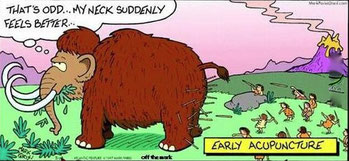
“What do you do?” Inquiring about one’s profession seems simple enough, but in my world answering this question is like a bomb.
I briefly describe my area of specialty within veterinary medicine, and I explain that acupuncture is one facet of my integrative practice. Then I wait for the response: the explosion. A profound proclamation of belief is coming.
This goes one of two ways:
“Oh, I believe in acupuncture.” The tone gets serious and deep. This is commonly followed by declarations about energy and the wisdom of Chinese philosophy. Then the flood gates of sharing open, and I hear private details, that may have been better left private, about acupuncture successes.
Or, with sudden confidence and a hardened jaw, some people declare, “I don’t believe in acupuncture. I think it’s bull****.”
This is the good stuff. Let’s take a look at what acupuncture is.
Two paradigms
There are two different paradigms upon which acupuncture practice is based. The first, and the one more people are familiar with, is Traditional Chinese Medicine (TCM). Surprising to many, modern TCM has only been around for a little over 60 years. It does, however, have roots in practice from 3,000 years ago.
The foundation of TCM is moving Qi (“chi”, or energy) along mapped meridians in the body. TCM diagnosis and treatment is based on metaphors used to describe the relationships among five fundamental elements. These elements represent organ systems. Imbalances in the elements are at the root of clinical disease. This paradigm is fascinating and has quite successful outcomes.
Interestingly, with scientific progress, we are now able to understand a significant amount of the science behind why acupuncture works.
This brings us to the second paradigm: medical acupuncture. This paradigm is based on an in-depth understanding of anatomy and physiology, specifically neuroanatomy and physiology. Acupuncture has 5 main mechanisms of action: local effects, segmental effects, extra-segmental effects, central regulatory effects, and trigger point release.
What are acupuncture points?

Acupuncture points are often locations where nerves enter or exit the fascia and muscles. A specific point is chosen with the understanding of how it can influence the nervous system.
What other muscles does this nerve control? Where does it synapse in the spinal cord? Which nucleus in the brain is the final destination? What other nerves originate from this nucleus? What organs and muscles do those nerves regulate? How can I influence local and distant targets from this point?
The details
Let’s take, for example, an acupoint just below the knee called ST 36. A needle at this point, through a cascade of local effects, can influence the knee. It also happens to be on a branch of the sciatic nerve which synapses in the spinal cord near the junction of the lumbar and sacral vertebrae (lower back). Because of segmental (regional) effects, ST 36 can influence both hind limbs.
The final destination of the nerve impulse, after it travels up the spinal cord, is a nucleus in the brain called the nucleus tractus solitarius. Interestingly, the vagus nerve, which influences digestion among other things, originates at this same nucleus.
This is how one needle placed near the knee can have local effects, regional effects, and central regulatory effects that influence digestion.
do you believe?
My response to the non-believers? “Do you believe in Ibuprofen?”
I have great news for believers and non-believers alike. I can confidently say acupuncture is NOT a belief system. We don’t have to pray to it for it to be effective. It has a mechanism of action that can be described just as Ibuprofen has a mechanism of action.
Neither is a panacea; neither is a cure-all, but each has its place in an arsenal of medical modalities.
(*Please note Ibuprofen is for humans only. It is highly toxic to your pets.)

Write a comment